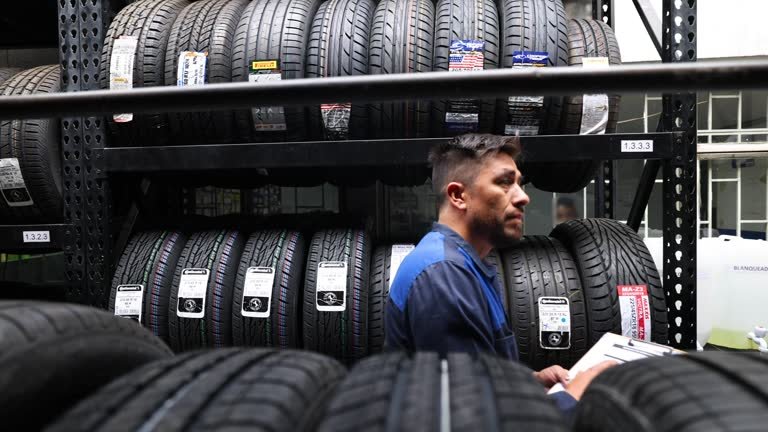
- calendar_month August 9, 2024
- folder Community Engagement
Sharing Tags
American Tires, JohnHart, JohnHart Real Estate, Nathan Derry, Nathan Derry JohnHart, Nathan Derry Realty, Nathan Derry Recommends, Nathan Derry, JohnHart Real Estate, NHTSA, Recyclable Tires, Tire Brands, Tire Facts, Tire Manufacturing, Tire Regulations, Tire Safety, Vehicle Safety

Tires are one of the most critical components of any vehicle, playing a vital role in safety, efficiency, and overall performance. But how much do we really know about the tires we rely on every day? Let's dive into the world of American tires, exploring their production, regulation, and some intriguing facts that may surprise you.
How Are Tires Made?

The tire manufacturing process is both complex and fascinating, involving several stages:
- Material Preparation: Tires are primarily made from rubber, which is mixed with other materials such as sulfur, carbon black, and various chemicals to enhance durability and performance.
- Component Manufacturing: Different parts of the tire, like the tread, sidewalls, and inner liner, are manufactured separately. Steel belts and textile plies are also created to provide strength and flexibility.
- Tire Building: All components are assembled on a tire-building machine. Layers are placed in a specific order to ensure the tire's structural integrity.
- Vulcanization: The assembled tire is then heated in a curing press, where the rubber is vulcanized (hardened) to form a solid, durable structure.
- Inspection: Each tire undergoes rigorous inspection to ensure it meets quality and safety standards. This includes visual checks and various tests for balance, uniformity, and more.
Are Tires Regulated? If So, Why?

Yes, tires are heavily regulated to ensure safety and performance. In the United States, the National Highway Traffic Safety Administration (NHTSA) sets standards for tire safety under the Federal Motor Vehicle Safety Standards (FMVSS). These regulations cover various aspects such as:
- Treadwear: Ensuring the tire lasts for a reasonable amount of time without excessive wear.
- Traction: Guaranteeing the tire can grip the road effectively, especially in wet conditions.
- Temperature Resistance: Making sure the tire can withstand high temperatures without failure.
These regulations are crucial because tires directly impact a vehicle's handling, braking, and overall safety. A failure in tire performance can lead to accidents, making strict oversight essential.
Why Are There Only a Few Large-Name Corporate Tire Companies?

The tire industry is dominated by a few large companies due to several factors:
- High Entry Barriers: The cost of setting up a tire manufacturing plant and maintaining the necessary technology and quality control systems is substantial.
- Economies of Scale: Large companies benefit from economies of scale, allowing them to produce tires more efficiently and at a lower cost.
- Brand Trust: Established brands have built trust over years, making it difficult for new entrants to gain a significant market share.
Some of the most well-known tire companies include Michelin, Goodyear, Bridgestone, and Continental.
Interesting Facts About Tires

- Tire Colors: Tires are naturally white due to the color of rubber. Carbon black is added to increase strength and durability, giving tires their characteristic black color.
- Recyclability: Tires are highly recyclable. Old tires can be used in various applications, including construction materials, playground surfaces, and even new tires.
- Air Pressure: Maintaining proper tire pressure is critical. Under-inflated tires can reduce fuel efficiency and increase wear, while over-inflated tires can reduce traction and comfort.
- Longevity: The average tire lasts for about 50,000 miles, but this can vary significantly based on driving habits, road conditions, and maintenance.
- Speed Ratings: Tires come with speed ratings indicating the maximum speed they can safely handle. Always check this rating to ensure your tires match your driving needs.
Understanding the intricacies of tire production, regulation, and the industry's landscape helps us appreciate the importance of these seemingly simple products. Tires are not just rubber circles—they are complex, engineered products that play a vital role in vehicle safety and performance. So next time you drive, remember the incredible journey that tire has taken to keep you safe on the road.
All the best,
Nathan Derry
JohnHart Real Estate

📍JohnHart Real Estate
📞(424) 303-0440
📧 nathan@jhagents.com
👨🏽💻 itsnathanderry.com
Interested in seeing a property or one of my off market properties in person? Contact me today! Who you hire matters!!!
Ready to make the best move of your life… let’s chat today!
